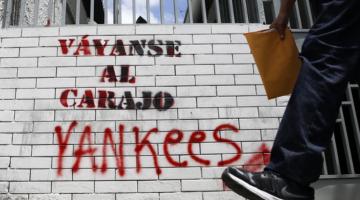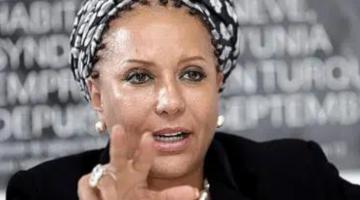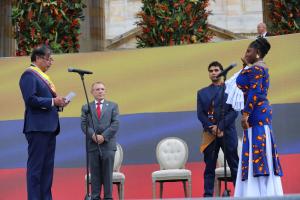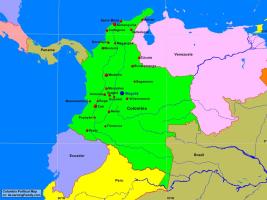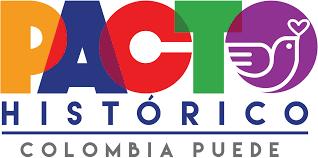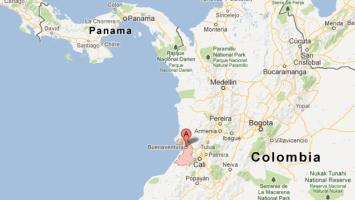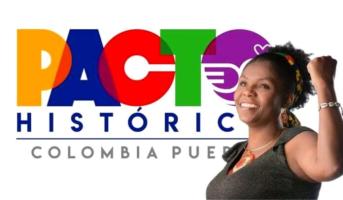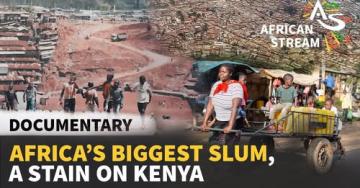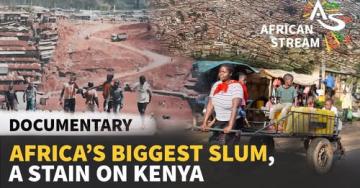Francia Marquez's rise to Colombia's vice presidency has put a target on her back, but she also brings with her hope for a real change in Colombian politics. As in the U.S., Black political power is met with fierce and sometimes violent opposition elsewhere in this region.
On June 16, during Father’s Day celebrations, Sigifredo Márquez, father of Colombia's Vice President Francia Márquez Mina, was attacked, also affecting a 6-year-old minor. This incident underscores the precarious position and constant threats that endanger the lives of Black leaders and communities in Latin America, where systemic oppression persists despite advances toward equality. Francia Márquez's political ascent has represented hope for social justice in ethnic communities, peasantry, and popular sectors. However, it has also been an affront to political and economic elites, serving as a catalyst for intensified violence not only against her but also against her community in Northern Cauca and other Afro-descendant communities in the country and region.
Francia Márquez has long been a formidable force in environmental activism. Emerging from an impoverished community in the department of Cauca, she defended the rights of Afro-Colombian communities against illegal mining and environmental destruction. Her activism earned her the prestigious Goldman Environmental Prize in 2018. Márquez's election as Colombia’s first Black Vice President in 2022 marked a historic milestone, but it also placed her in the crosshairs of entrenched powers resistant to change.
On June 16, 2024, during Father’s Day celebrations, Sigifredo Márquez's vehicle was attacked on the road to the corregimiento of Tambo (Cauca). Although Sigifredo and the minor escaped unharmed, the attack sent a chilling message to Francia Márquez, her supporters, and all human rights and territorial defenders. This act of violence is emblematic of the broader systemic issues affecting Black communities in Latin America, reflecting deep-seated racism and the resistance of conservative factions to the emancipation of the most impoverished populations and communities. This follows a similar incident last April when Márquez’s niece was shot, highlighting the continuous threats faced by her family in retaliation for her political work.
Black communities in Latin America have historically faced systemic oppression. From economic neglect to deprivation of social and political rights, these communities continue to battle against the legacies of colonialism and slavery. Policies that perpetuate inequality and incidents of violence against Black leaders are all too common. The attack on Sigifredo Márquez is not an isolated incident but part of a broader pattern of intimidation against Afro-descendant leadership, aimed at stifling progress and maintaining the status quo.
Between 2016 and 2023, a total of 1,294 social leaders have been assassinated in Colombia. Additionally, between January and April of this year, the UN Office for Human Rights received 43 reports of homicides of leaders and human rights defenders. These data highlight the dangers faced by defenders and social leaders in Colombia.
These violent acts send a clear message, that Black people do not belong in social and political decision-making spaces. Black communities must remain subjugated to power groups that condemn them to violence and oblivion. Blackness is the antithesis of citizenship. This systemic oppression manifests in multiple ways:
- Economic Neglect and Exclusion: Black communities are relegated to precarious jobs and their confinement to the informal economy results in significant barriers to improving their quality of life. This perpetuates cycles of poverty and limits opportunities for education and growth.
- Deprivation of Social Rights: Beyond inclusion rhetoric, Black communities concentrate the lowest levels of access to quality healthcare, education, and housing. This creates social environments where civil liberties are replaced by palliative measures that disguise the lack of commitment from institutions that do not develop effective actions to eradicate violence and exploitation.
- Deprivation of Political Rights: Historically, Black people have been excluded from political power. Even when they begin to gain political representation, as seen with Francia Márquez, they face strong campaigns of defamation, persecution, and terrorism. This violent resistance is a tool used by conservative factions and political elites to maintain their hegemony at the expense of silencing Afro-descendant leadership voices.
- Violence and Intimidation: Acts of violence, such as the attacks on Vice President Francia Márquez's father and niece, are terror tactics intended to instill fear and discourage political participation. These attacks are designed to reinforce the notion that Black people must remain invisible in subordinate positions.
- Legacies of Colonialism and Slavery: The historical context of colonialism and slavery has left enduring marks on the social structures of Latin American countries. These legacies continue to influence the attitudes and policies of many openly racist rulers who refer to Black communities as "backward" and "obstructors" of economic progress.
By targeting individuals who rise to challenge these systemic inequities, the perpetrators of such violence seek to erode opportunities for participation, representation, and decision-making, where Black people are unimaginable to occupy positions of influence. This systemic oppression is not only a barrier to individual progress but also a significant obstacle to the collective advancement of Black communities across Latin America.
Understanding these dynamics is crucial in addressing the root causes of violence and discrimination, advocating for systemic change, and strengthening the political autonomy mobilized by Black leaders like Francia Márquez. Her struggle is emblematic of a larger fight for equality and justice that continues to resonate throughout the region.
The state's response to violence against Black communities has been inadequate, often marked by neglect or complicity. Francia Márquez's call for increased state and military protection highlights the urgent need for accountability and institutional reform. However, the presence of state forces in impoverished and neglected communities can be a double-edged sword, sometimes exacerbating tensions and perpetuating violence rather than guaranteeing the lives and rights of the populations.
The attack on Sigifredo Márquez reflects the broader political climate in Latin America, characterized by the rise of conservative, ultra-right, and authoritarian regimes. These regimes often exacerbate racial and social divisions to consolidate power, attacking leaders who refuse to see their peoples remain captive to injustice. Francia Márquez's position as a Black Vice President challenges power structures deeply rooted in an idea of a white-mestizo national identity, provoking a violent reaction from those interested in maintaining racial, political, and economic hierarchies. Despite her worldwide recognition as an environmental activist or her titles as a lawyer, specialist in creative writing, and recently Honorary Doctor of Education, the Vice President is constantly pigeonholed into stereotypes of servitude and vulgarity.
Francia Márquez's journey from domestic worker, environmental activist, lawyer to Vice President is a powerful testament to the power of community, resilience, and determination within Black communities in Latin America. However, it also underscores the persistent vulnerabilities and ceilings faced by these communities. The attack on her father is a reminder of the dangers that come with challenging entrenched power. To support Black communities, it is crucial to raise awareness, advocate for systemic change, and stand in solidarity with those fighting for justice.
The resilience and determination of leaders like Francia Márquez offer hope for a more equitable future, but achieving this vision requires a concerted effort and unwavering commitment from all of us.
From AfroResistencia, we call on the international community, organizations, and communities defending territories and human rights to remain vigilant and demand the protection and security of Vice President Francia Márquez, her family, and her supporters. Our commitment is with what Francia represents for Black peoples and communities in the Americas.
Mauri Balanta Jaramillo is the Deputy Director at AfroResistance, bringing extensive experience and a strong commitment to social justice. She holds advanced degrees in Cultural Diversity and Intercultural Communication from the Institut für Auslandsbeziehungen in Germany and a Bachelor's in Popular Education from Universidad del Valle, Colombia. Her work focuses on advocating for human rights, equity, and justice, especially for Black women, femmes, and girls across the Americas.
Janvieve Williams Comrie is a sociologist, human rights strategist, and movement facilitator. She is the founder and current Executive Director of AfroResistance, an international organization committed to human rights, democracy and racial justice in the Americas. As a sought-after migration strategist, international human rights expert, consultant, speaker, and certified personal coach, Janvieve has strategized, advised, and worked with a myriad of people worldwide, including heads of state.

